Unit 12: Organisational Behaviour Report - APPLE and IBM Comparison
VerifiedAdded on 2023/01/06
|23
|5895
|64
Report
AI Summary
This report provides a comprehensive analysis of the organizational behavior of Apple and IBM. It begins by examining Apple's culture, power-sharing dynamics, and the influence of Steve Jobs' leadership, including discussions on Maslow's Hierarchy of Needs, Vroom's Expectancy Theory, and the impact of cultural values on employees. The report then shifts to IBM, exploring team development through the Tuckman Model and Belbin's Team Roles, alongside the application of Path-Goal Theory and Social Capital Theory. The study highlights the influence of organizational behavior on both companies, offering insights into how leadership, motivation, and team dynamics shape their performance and employee experience. The report emphasizes the impact of centralized versus decentralized power structures, political influences, and the role of motivation in fostering employee engagement and innovation within each organization. The analysis draws on various theories and frameworks to provide a comparative understanding of organizational behavior in two leading technology companies.
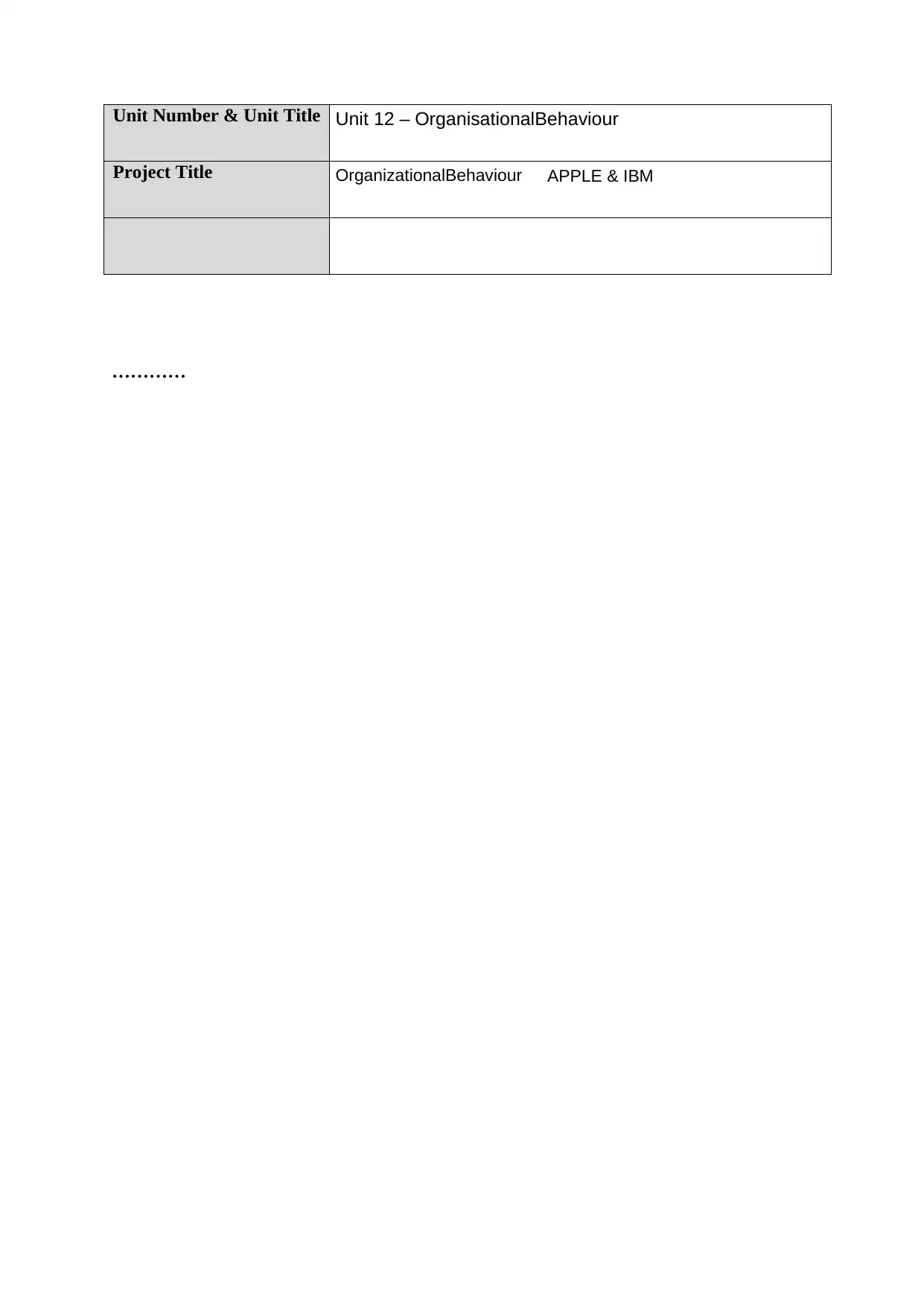
Unit Number & Unit Title Unit 12 – OrganisationalBehaviour
Project Title OrganizationalBehaviour APPLE & IBM
…………
Project Title OrganizationalBehaviour APPLE & IBM
…………
Paraphrase This Document
Need a fresh take? Get an instant paraphrase of this document with our AI Paraphraser
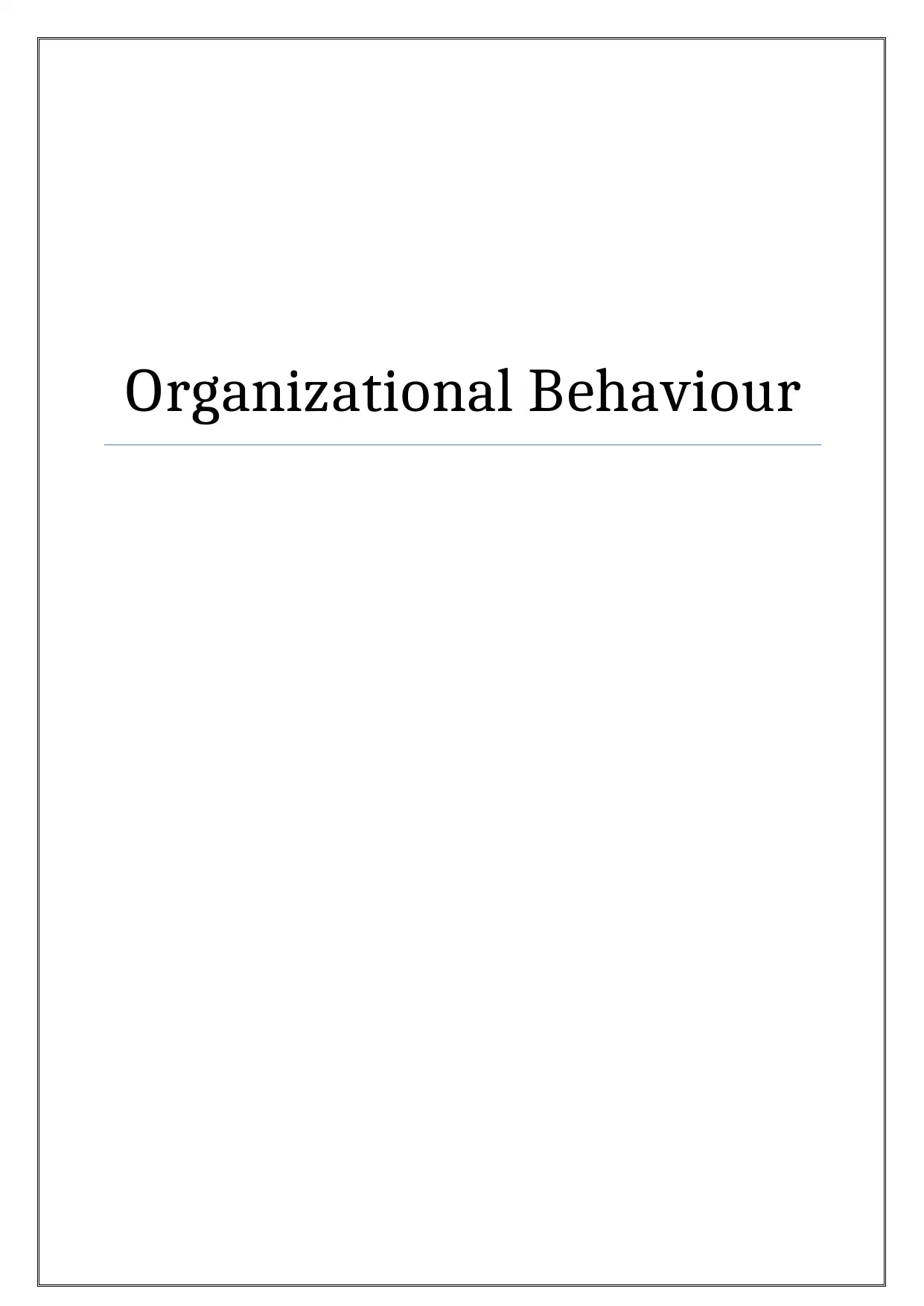
Organizational Behaviour
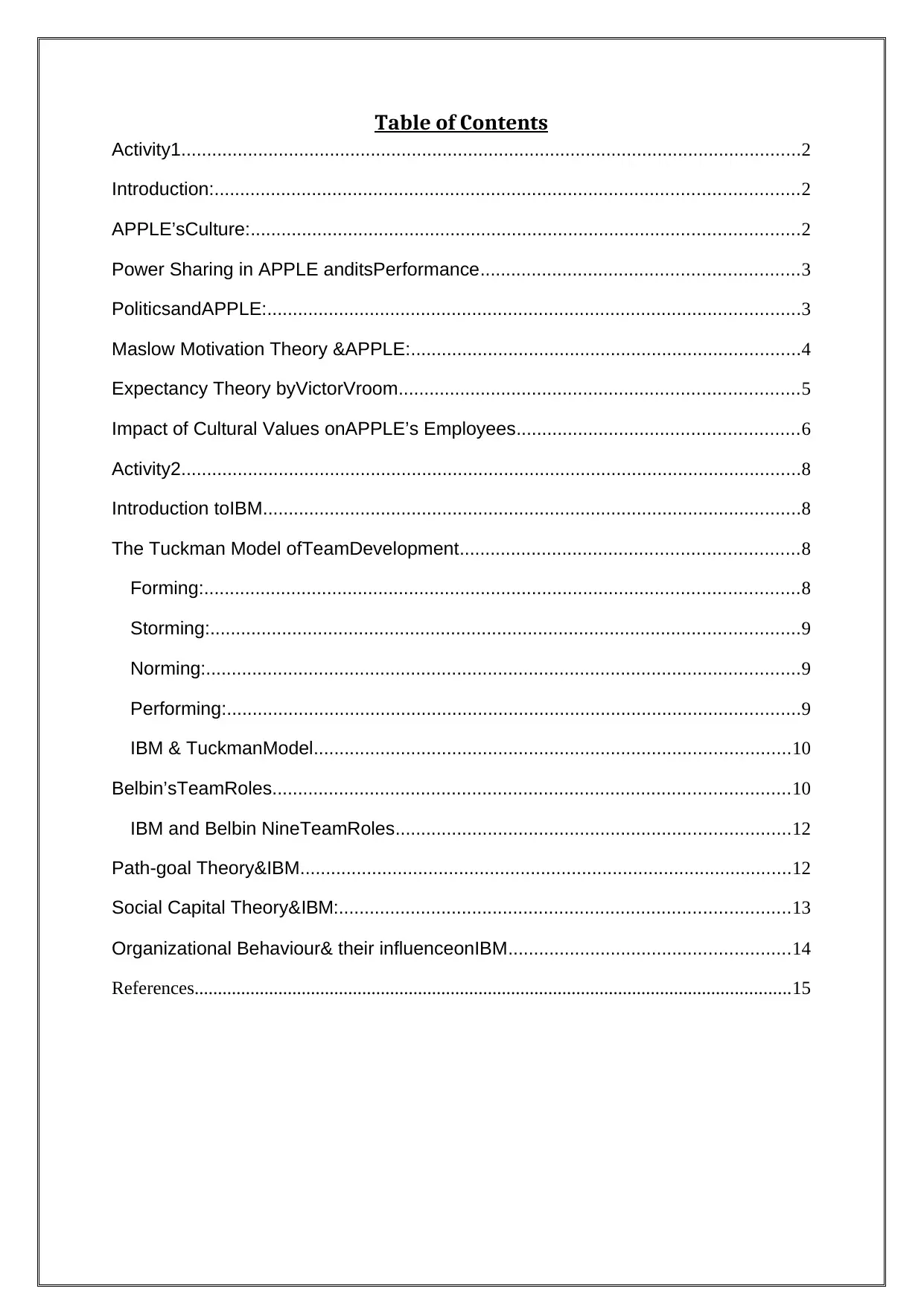
Table of Contents
Activity1.........................................................................................................................2
Introduction:..................................................................................................................2
APPLE’sCulture:...........................................................................................................2
Power Sharing in APPLE anditsPerformance..............................................................3
PoliticsandAPPLE:........................................................................................................3
Maslow Motivation Theory &APPLE:............................................................................4
Expectancy Theory byVictorVroom..............................................................................5
Impact of Cultural Values onAPPLE’s Employees.......................................................6
Activity2.........................................................................................................................8
Introduction toIBM.........................................................................................................8
The Tuckman Model ofTeamDevelopment..................................................................8
Forming:....................................................................................................................8
Storming:...................................................................................................................9
Norming:....................................................................................................................9
Performing:................................................................................................................9
IBM & TuckmanModel.............................................................................................10
Belbin’sTeamRoles.....................................................................................................10
IBM and Belbin NineTeamRoles.............................................................................12
Path-goal Theory&IBM................................................................................................12
Social Capital Theory&IBM:........................................................................................13
Organizational Behaviour& their influenceonIBM.......................................................14
References................................................................................................................................15
Activity1.........................................................................................................................2
Introduction:..................................................................................................................2
APPLE’sCulture:...........................................................................................................2
Power Sharing in APPLE anditsPerformance..............................................................3
PoliticsandAPPLE:........................................................................................................3
Maslow Motivation Theory &APPLE:............................................................................4
Expectancy Theory byVictorVroom..............................................................................5
Impact of Cultural Values onAPPLE’s Employees.......................................................6
Activity2.........................................................................................................................8
Introduction toIBM.........................................................................................................8
The Tuckman Model ofTeamDevelopment..................................................................8
Forming:....................................................................................................................8
Storming:...................................................................................................................9
Norming:....................................................................................................................9
Performing:................................................................................................................9
IBM & TuckmanModel.............................................................................................10
Belbin’sTeamRoles.....................................................................................................10
IBM and Belbin NineTeamRoles.............................................................................12
Path-goal Theory&IBM................................................................................................12
Social Capital Theory&IBM:........................................................................................13
Organizational Behaviour& their influenceonIBM.......................................................14
References................................................................................................................................15
⊘ This is a preview!⊘
Do you want full access?
Subscribe today to unlock all pages.

Trusted by 1+ million students worldwide
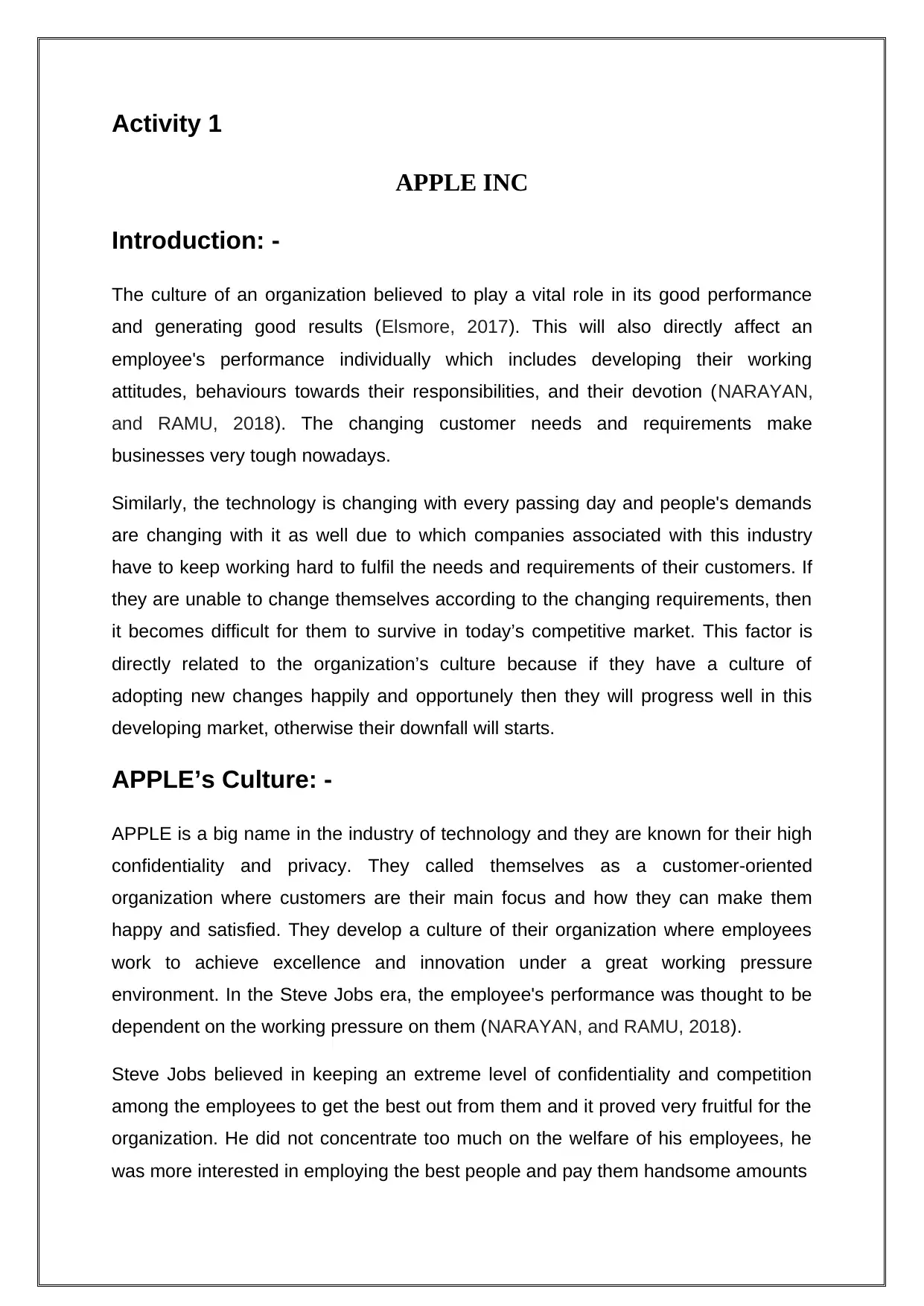
Activity 1
APPLE INC
Introduction: -
The culture of an organization believed to play a vital role in its good performance
and generating good results (Elsmore, 2017). This will also directly affect an
employee's performance individually which includes developing their working
attitudes, behaviours towards their responsibilities, and their devotion (NARAYAN,
and RAMU, 2018). The changing customer needs and requirements make
businesses very tough nowadays.
Similarly, the technology is changing with every passing day and people's demands
are changing with it as well due to which companies associated with this industry
have to keep working hard to fulfil the needs and requirements of their customers. If
they are unable to change themselves according to the changing requirements, then
it becomes difficult for them to survive in today’s competitive market. This factor is
directly related to the organization’s culture because if they have a culture of
adopting new changes happily and opportunely then they will progress well in this
developing market, otherwise their downfall will starts.
APPLE’s Culture: -
APPLE is a big name in the industry of technology and they are known for their high
confidentiality and privacy. They called themselves as a customer-oriented
organization where customers are their main focus and how they can make them
happy and satisfied. They develop a culture of their organization where employees
work to achieve excellence and innovation under a great working pressure
environment. In the Steve Jobs era, the employee's performance was thought to be
dependent on the working pressure on them (NARAYAN, and RAMU, 2018).
Steve Jobs believed in keeping an extreme level of confidentiality and competition
among the employees to get the best out from them and it proved very fruitful for the
organization. He did not concentrate too much on the welfare of his employees, he
was more interested in employing the best people and pay them handsome amounts
APPLE INC
Introduction: -
The culture of an organization believed to play a vital role in its good performance
and generating good results (Elsmore, 2017). This will also directly affect an
employee's performance individually which includes developing their working
attitudes, behaviours towards their responsibilities, and their devotion (NARAYAN,
and RAMU, 2018). The changing customer needs and requirements make
businesses very tough nowadays.
Similarly, the technology is changing with every passing day and people's demands
are changing with it as well due to which companies associated with this industry
have to keep working hard to fulfil the needs and requirements of their customers. If
they are unable to change themselves according to the changing requirements, then
it becomes difficult for them to survive in today’s competitive market. This factor is
directly related to the organization’s culture because if they have a culture of
adopting new changes happily and opportunely then they will progress well in this
developing market, otherwise their downfall will starts.
APPLE’s Culture: -
APPLE is a big name in the industry of technology and they are known for their high
confidentiality and privacy. They called themselves as a customer-oriented
organization where customers are their main focus and how they can make them
happy and satisfied. They develop a culture of their organization where employees
work to achieve excellence and innovation under a great working pressure
environment. In the Steve Jobs era, the employee's performance was thought to be
dependent on the working pressure on them (NARAYAN, and RAMU, 2018).
Steve Jobs believed in keeping an extreme level of confidentiality and competition
among the employees to get the best out from them and it proved very fruitful for the
organization. He did not concentrate too much on the welfare of his employees, he
was more interested in employing the best people and pay them handsome amounts
Paraphrase This Document
Need a fresh take? Get an instant paraphrase of this document with our AI Paraphraser
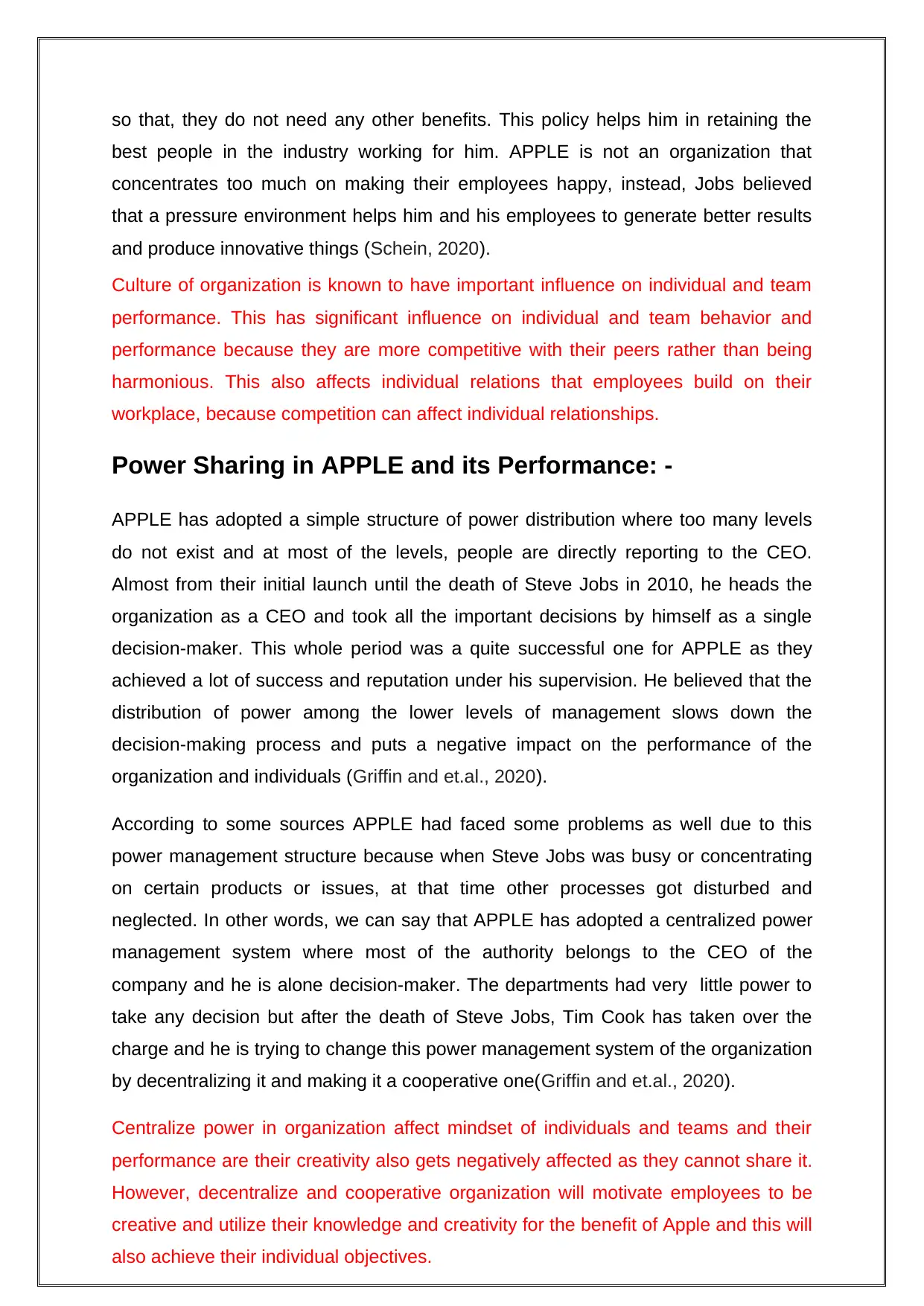
so that, they do not need any other benefits. This policy helps him in retaining the
best people in the industry working for him. APPLE is not an organization that
concentrates too much on making their employees happy, instead, Jobs believed
that a pressure environment helps him and his employees to generate better results
and produce innovative things (Schein, 2020).
Culture of organization is known to have important influence on individual and team
performance. This has significant influence on individual and team behavior and
performance because they are more competitive with their peers rather than being
harmonious. This also affects individual relations that employees build on their
workplace, because competition can affect individual relationships.
Power Sharing in APPLE and its Performance: -
APPLE has adopted a simple structure of power distribution where too many levels
do not exist and at most of the levels, people are directly reporting to the CEO.
Almost from their initial launch until the death of Steve Jobs in 2010, he heads the
organization as a CEO and took all the important decisions by himself as a single
decision-maker. This whole period was a quite successful one for APPLE as they
achieved a lot of success and reputation under his supervision. He believed that the
distribution of power among the lower levels of management slows down the
decision-making process and puts a negative impact on the performance of the
organization and individuals (Griffin and et.al., 2020).
According to some sources APPLE had faced some problems as well due to this
power management structure because when Steve Jobs was busy or concentrating
on certain products or issues, at that time other processes got disturbed and
neglected. In other words, we can say that APPLE has adopted a centralized power
management system where most of the authority belongs to the CEO of the
company and he is alone decision-maker. The departments had very little power to
take any decision but after the death of Steve Jobs, Tim Cook has taken over the
charge and he is trying to change this power management system of the organization
by decentralizing it and making it a cooperative one(Griffin and et.al., 2020).
Centralize power in organization affect mindset of individuals and teams and their
performance are their creativity also gets negatively affected as they cannot share it.
However, decentralize and cooperative organization will motivate employees to be
creative and utilize their knowledge and creativity for the benefit of Apple and this will
also achieve their individual objectives.
best people in the industry working for him. APPLE is not an organization that
concentrates too much on making their employees happy, instead, Jobs believed
that a pressure environment helps him and his employees to generate better results
and produce innovative things (Schein, 2020).
Culture of organization is known to have important influence on individual and team
performance. This has significant influence on individual and team behavior and
performance because they are more competitive with their peers rather than being
harmonious. This also affects individual relations that employees build on their
workplace, because competition can affect individual relationships.
Power Sharing in APPLE and its Performance: -
APPLE has adopted a simple structure of power distribution where too many levels
do not exist and at most of the levels, people are directly reporting to the CEO.
Almost from their initial launch until the death of Steve Jobs in 2010, he heads the
organization as a CEO and took all the important decisions by himself as a single
decision-maker. This whole period was a quite successful one for APPLE as they
achieved a lot of success and reputation under his supervision. He believed that the
distribution of power among the lower levels of management slows down the
decision-making process and puts a negative impact on the performance of the
organization and individuals (Griffin and et.al., 2020).
According to some sources APPLE had faced some problems as well due to this
power management structure because when Steve Jobs was busy or concentrating
on certain products or issues, at that time other processes got disturbed and
neglected. In other words, we can say that APPLE has adopted a centralized power
management system where most of the authority belongs to the CEO of the
company and he is alone decision-maker. The departments had very little power to
take any decision but after the death of Steve Jobs, Tim Cook has taken over the
charge and he is trying to change this power management system of the organization
by decentralizing it and making it a cooperative one(Griffin and et.al., 2020).
Centralize power in organization affect mindset of individuals and teams and their
performance are their creativity also gets negatively affected as they cannot share it.
However, decentralize and cooperative organization will motivate employees to be
creative and utilize their knowledge and creativity for the benefit of Apple and this will
also achieve their individual objectives.
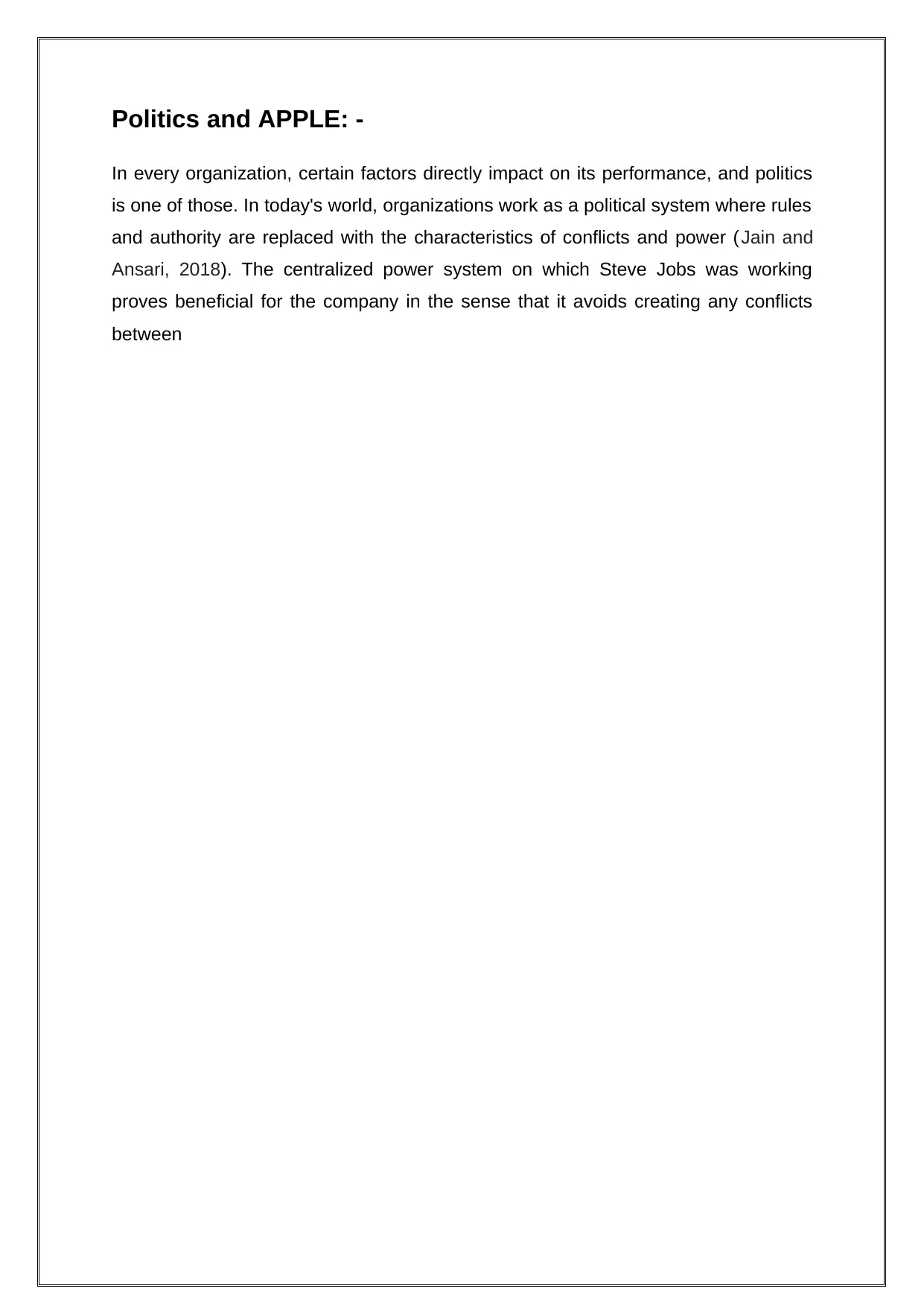
Politics and APPLE: -
In every organization, certain factors directly impact on its performance, and politics
is one of those. In today's world, organizations work as a political system where rules
and authority are replaced with the characteristics of conflicts and power (Jain and
Ansari, 2018). The centralized power system on which Steve Jobs was working
proves beneficial for the company in the sense that it avoids creating any conflicts
between
In every organization, certain factors directly impact on its performance, and politics
is one of those. In today's world, organizations work as a political system where rules
and authority are replaced with the characteristics of conflicts and power (Jain and
Ansari, 2018). The centralized power system on which Steve Jobs was working
proves beneficial for the company in the sense that it avoids creating any conflicts
between
⊘ This is a preview!⊘
Do you want full access?
Subscribe today to unlock all pages.

Trusted by 1+ million students worldwide
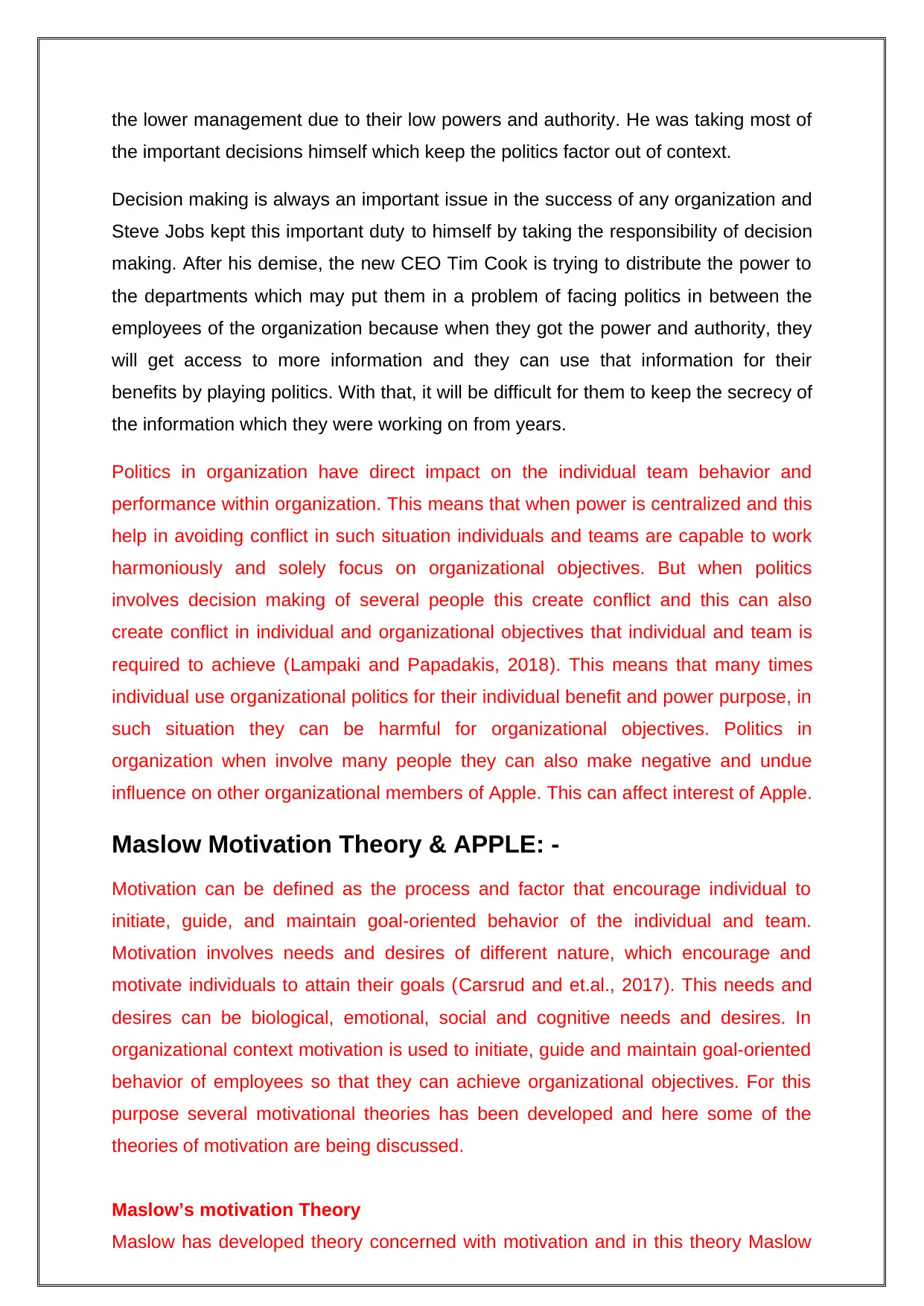
the lower management due to their low powers and authority. He was taking most of
the important decisions himself which keep the politics factor out of context.
Decision making is always an important issue in the success of any organization and
Steve Jobs kept this important duty to himself by taking the responsibility of decision
making. After his demise, the new CEO Tim Cook is trying to distribute the power to
the departments which may put them in a problem of facing politics in between the
employees of the organization because when they got the power and authority, they
will get access to more information and they can use that information for their
benefits by playing politics. With that, it will be difficult for them to keep the secrecy of
the information which they were working on from years.
Politics in organization have direct impact on the individual team behavior and
performance within organization. This means that when power is centralized and this
help in avoiding conflict in such situation individuals and teams are capable to work
harmoniously and solely focus on organizational objectives. But when politics
involves decision making of several people this create conflict and this can also
create conflict in individual and organizational objectives that individual and team is
required to achieve (Lampaki and Papadakis, 2018). This means that many times
individual use organizational politics for their individual benefit and power purpose, in
such situation they can be harmful for organizational objectives. Politics in
organization when involve many people they can also make negative and undue
influence on other organizational members of Apple. This can affect interest of Apple.
Maslow Motivation Theory & APPLE: -
Motivation can be defined as the process and factor that encourage individual to
initiate, guide, and maintain goal-oriented behavior of the individual and team.
Motivation involves needs and desires of different nature, which encourage and
motivate individuals to attain their goals (Carsrud and et.al., 2017). This needs and
desires can be biological, emotional, social and cognitive needs and desires. In
organizational context motivation is used to initiate, guide and maintain goal-oriented
behavior of employees so that they can achieve organizational objectives. For this
purpose several motivational theories has been developed and here some of the
theories of motivation are being discussed.
Maslow’s motivation Theory
Maslow has developed theory concerned with motivation and in this theory Maslow
the important decisions himself which keep the politics factor out of context.
Decision making is always an important issue in the success of any organization and
Steve Jobs kept this important duty to himself by taking the responsibility of decision
making. After his demise, the new CEO Tim Cook is trying to distribute the power to
the departments which may put them in a problem of facing politics in between the
employees of the organization because when they got the power and authority, they
will get access to more information and they can use that information for their
benefits by playing politics. With that, it will be difficult for them to keep the secrecy of
the information which they were working on from years.
Politics in organization have direct impact on the individual team behavior and
performance within organization. This means that when power is centralized and this
help in avoiding conflict in such situation individuals and teams are capable to work
harmoniously and solely focus on organizational objectives. But when politics
involves decision making of several people this create conflict and this can also
create conflict in individual and organizational objectives that individual and team is
required to achieve (Lampaki and Papadakis, 2018). This means that many times
individual use organizational politics for their individual benefit and power purpose, in
such situation they can be harmful for organizational objectives. Politics in
organization when involve many people they can also make negative and undue
influence on other organizational members of Apple. This can affect interest of Apple.
Maslow Motivation Theory & APPLE: -
Motivation can be defined as the process and factor that encourage individual to
initiate, guide, and maintain goal-oriented behavior of the individual and team.
Motivation involves needs and desires of different nature, which encourage and
motivate individuals to attain their goals (Carsrud and et.al., 2017). This needs and
desires can be biological, emotional, social and cognitive needs and desires. In
organizational context motivation is used to initiate, guide and maintain goal-oriented
behavior of employees so that they can achieve organizational objectives. For this
purpose several motivational theories has been developed and here some of the
theories of motivation are being discussed.
Maslow’s motivation Theory
Maslow has developed theory concerned with motivation and in this theory Maslow
Paraphrase This Document
Need a fresh take? Get an instant paraphrase of this document with our AI Paraphraser
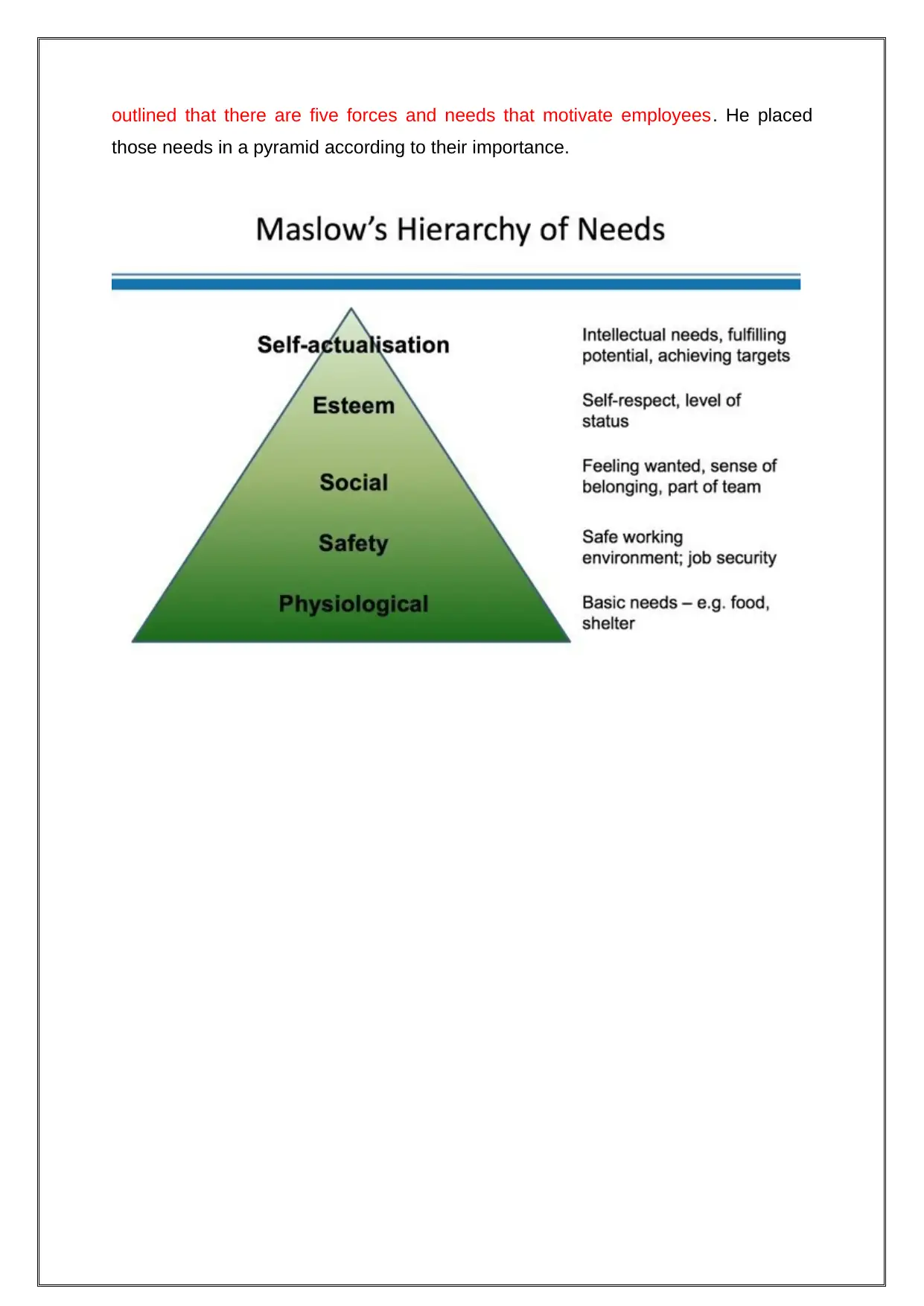
outlined that there are five forces and needs that motivate employees. He placed
those needs in a pyramid according to their importance.
those needs in a pyramid according to their importance.
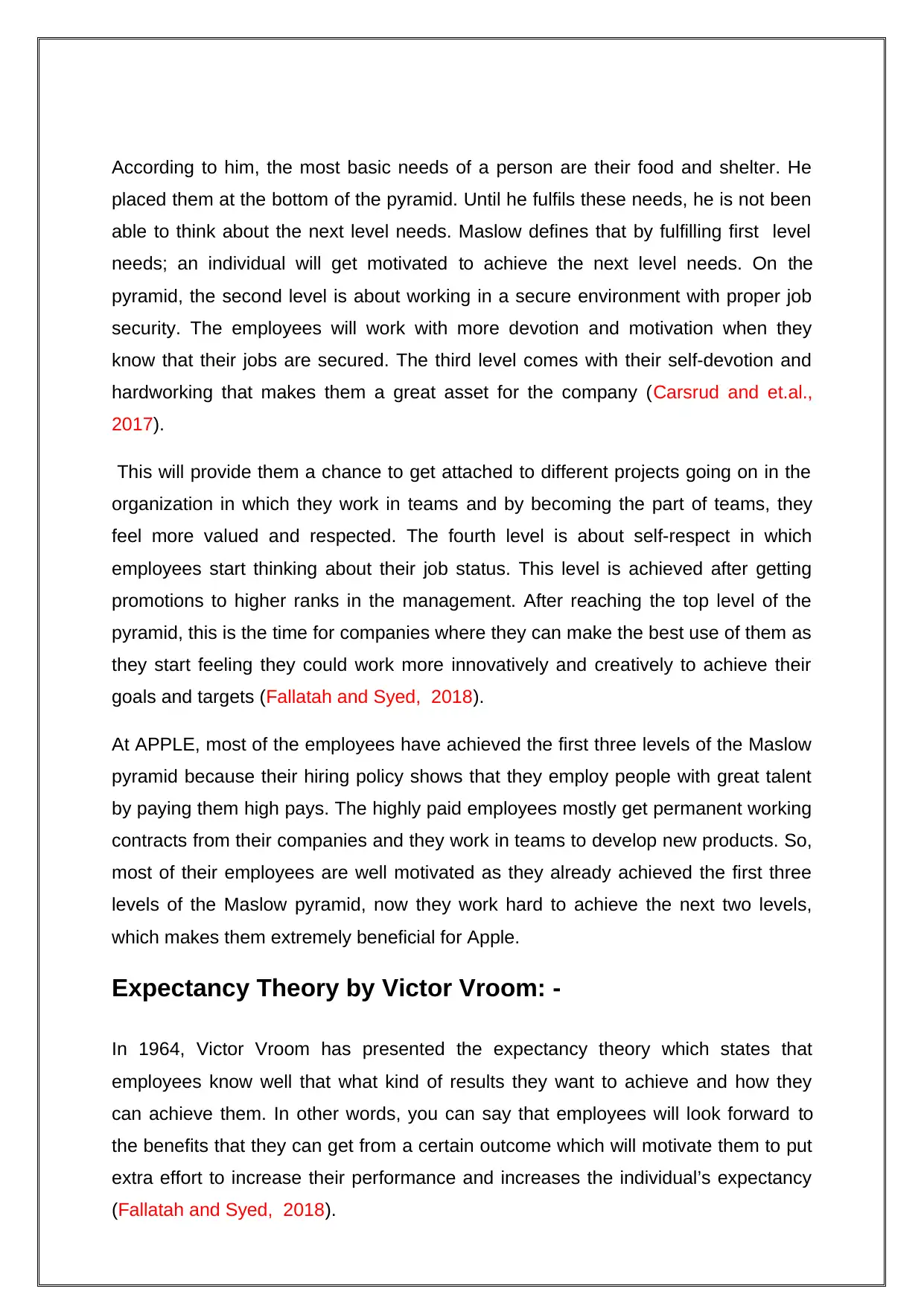
According to him, the most basic needs of a person are their food and shelter. He
placed them at the bottom of the pyramid. Until he fulfils these needs, he is not been
able to think about the next level needs. Maslow defines that by fulfilling first level
needs; an individual will get motivated to achieve the next level needs. On the
pyramid, the second level is about working in a secure environment with proper job
security. The employees will work with more devotion and motivation when they
know that their jobs are secured. The third level comes with their self-devotion and
hardworking that makes them a great asset for the company (Carsrud and et.al.,
2017).
This will provide them a chance to get attached to different projects going on in the
organization in which they work in teams and by becoming the part of teams, they
feel more valued and respected. The fourth level is about self-respect in which
employees start thinking about their job status. This level is achieved after getting
promotions to higher ranks in the management. After reaching the top level of the
pyramid, this is the time for companies where they can make the best use of them as
they start feeling they could work more innovatively and creatively to achieve their
goals and targets (Fallatah and Syed, 2018).
At APPLE, most of the employees have achieved the first three levels of the Maslow
pyramid because their hiring policy shows that they employ people with great talent
by paying them high pays. The highly paid employees mostly get permanent working
contracts from their companies and they work in teams to develop new products. So,
most of their employees are well motivated as they already achieved the first three
levels of the Maslow pyramid, now they work hard to achieve the next two levels,
which makes them extremely beneficial for Apple.
Expectancy Theory by Victor Vroom: -
In 1964, Victor Vroom has presented the expectancy theory which states that
employees know well that what kind of results they want to achieve and how they
can achieve them. In other words, you can say that employees will look forward to
the benefits that they can get from a certain outcome which will motivate them to put
extra effort to increase their performance and increases the individual’s expectancy
(Fallatah and Syed, 2018).
placed them at the bottom of the pyramid. Until he fulfils these needs, he is not been
able to think about the next level needs. Maslow defines that by fulfilling first level
needs; an individual will get motivated to achieve the next level needs. On the
pyramid, the second level is about working in a secure environment with proper job
security. The employees will work with more devotion and motivation when they
know that their jobs are secured. The third level comes with their self-devotion and
hardworking that makes them a great asset for the company (Carsrud and et.al.,
2017).
This will provide them a chance to get attached to different projects going on in the
organization in which they work in teams and by becoming the part of teams, they
feel more valued and respected. The fourth level is about self-respect in which
employees start thinking about their job status. This level is achieved after getting
promotions to higher ranks in the management. After reaching the top level of the
pyramid, this is the time for companies where they can make the best use of them as
they start feeling they could work more innovatively and creatively to achieve their
goals and targets (Fallatah and Syed, 2018).
At APPLE, most of the employees have achieved the first three levels of the Maslow
pyramid because their hiring policy shows that they employ people with great talent
by paying them high pays. The highly paid employees mostly get permanent working
contracts from their companies and they work in teams to develop new products. So,
most of their employees are well motivated as they already achieved the first three
levels of the Maslow pyramid, now they work hard to achieve the next two levels,
which makes them extremely beneficial for Apple.
Expectancy Theory by Victor Vroom: -
In 1964, Victor Vroom has presented the expectancy theory which states that
employees know well that what kind of results they want to achieve and how they
can achieve them. In other words, you can say that employees will look forward to
the benefits that they can get from a certain outcome which will motivate them to put
extra effort to increase their performance and increases the individual’s expectancy
(Fallatah and Syed, 2018).
⊘ This is a preview!⊘
Do you want full access?
Subscribe today to unlock all pages.

Trusted by 1+ million students worldwide
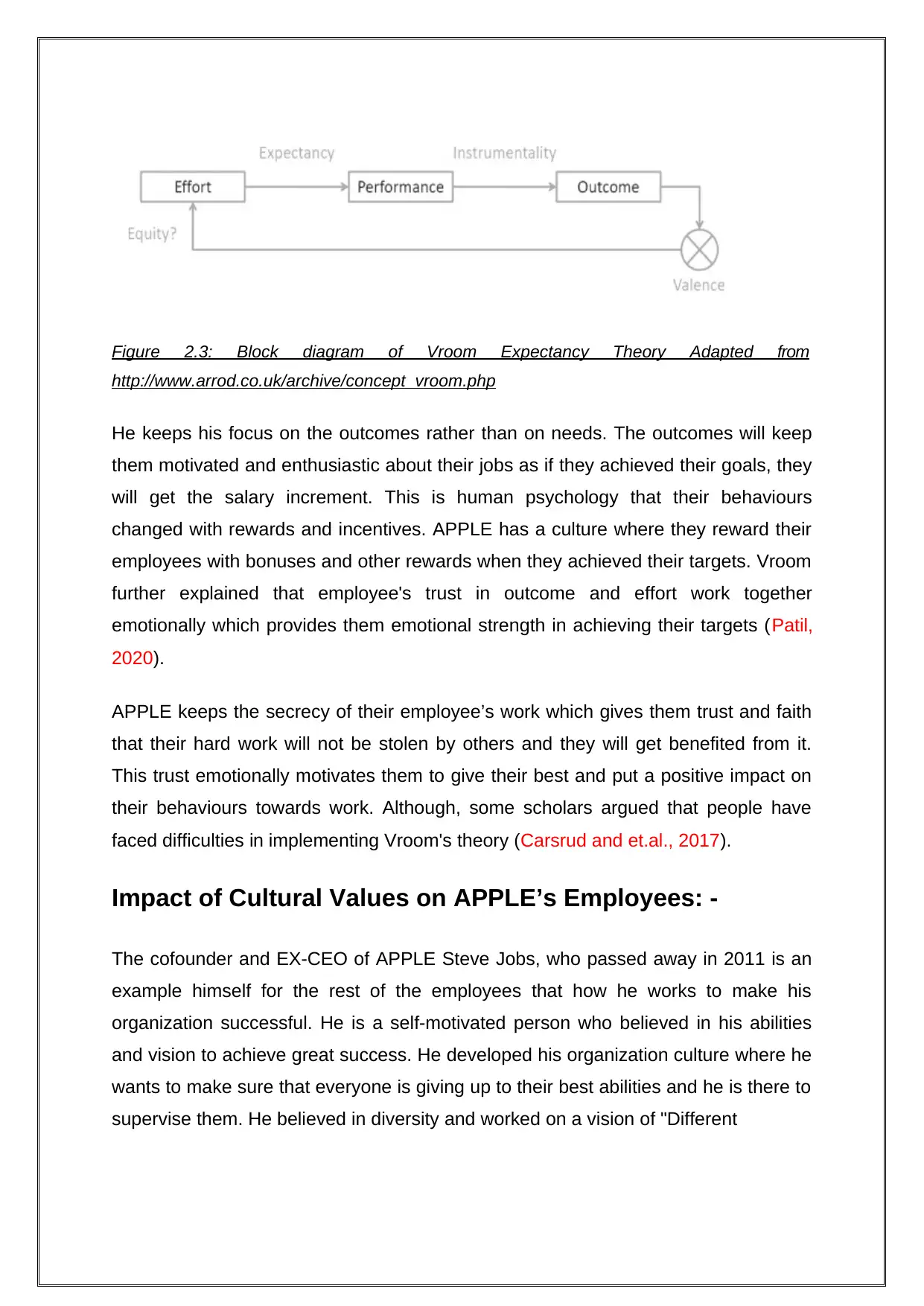
Figure 2.3: Block diagram of Vroom Expectancy Theory Adapted from
http://www.arrod.co.uk/archive/concept_vroom.php
He keeps his focus on the outcomes rather than on needs. The outcomes will keep
them motivated and enthusiastic about their jobs as if they achieved their goals, they
will get the salary increment. This is human psychology that their behaviours
changed with rewards and incentives. APPLE has a culture where they reward their
employees with bonuses and other rewards when they achieved their targets. Vroom
further explained that employee's trust in outcome and effort work together
emotionally which provides them emotional strength in achieving their targets (Patil,
2020).
APPLE keeps the secrecy of their employee’s work which gives them trust and faith
that their hard work will not be stolen by others and they will get benefited from it.
This trust emotionally motivates them to give their best and put a positive impact on
their behaviours towards work. Although, some scholars argued that people have
faced difficulties in implementing Vroom's theory (Carsrud and et.al., 2017).
Impact of Cultural Values on APPLE’s Employees: -
The cofounder and EX-CEO of APPLE Steve Jobs, who passed away in 2011 is an
example himself for the rest of the employees that how he works to make his
organization successful. He is a self-motivated person who believed in his abilities
and vision to achieve great success. He developed his organization culture where he
wants to make sure that everyone is giving up to their best abilities and he is there to
supervise them. He believed in diversity and worked on a vision of "Different
http://www.arrod.co.uk/archive/concept_vroom.php
He keeps his focus on the outcomes rather than on needs. The outcomes will keep
them motivated and enthusiastic about their jobs as if they achieved their goals, they
will get the salary increment. This is human psychology that their behaviours
changed with rewards and incentives. APPLE has a culture where they reward their
employees with bonuses and other rewards when they achieved their targets. Vroom
further explained that employee's trust in outcome and effort work together
emotionally which provides them emotional strength in achieving their targets (Patil,
2020).
APPLE keeps the secrecy of their employee’s work which gives them trust and faith
that their hard work will not be stolen by others and they will get benefited from it.
This trust emotionally motivates them to give their best and put a positive impact on
their behaviours towards work. Although, some scholars argued that people have
faced difficulties in implementing Vroom's theory (Carsrud and et.al., 2017).
Impact of Cultural Values on APPLE’s Employees: -
The cofounder and EX-CEO of APPLE Steve Jobs, who passed away in 2011 is an
example himself for the rest of the employees that how he works to make his
organization successful. He is a self-motivated person who believed in his abilities
and vision to achieve great success. He developed his organization culture where he
wants to make sure that everyone is giving up to their best abilities and he is there to
supervise them. He believed in diversity and worked on a vision of "Different
Paraphrase This Document
Need a fresh take? Get an instant paraphrase of this document with our AI Paraphraser
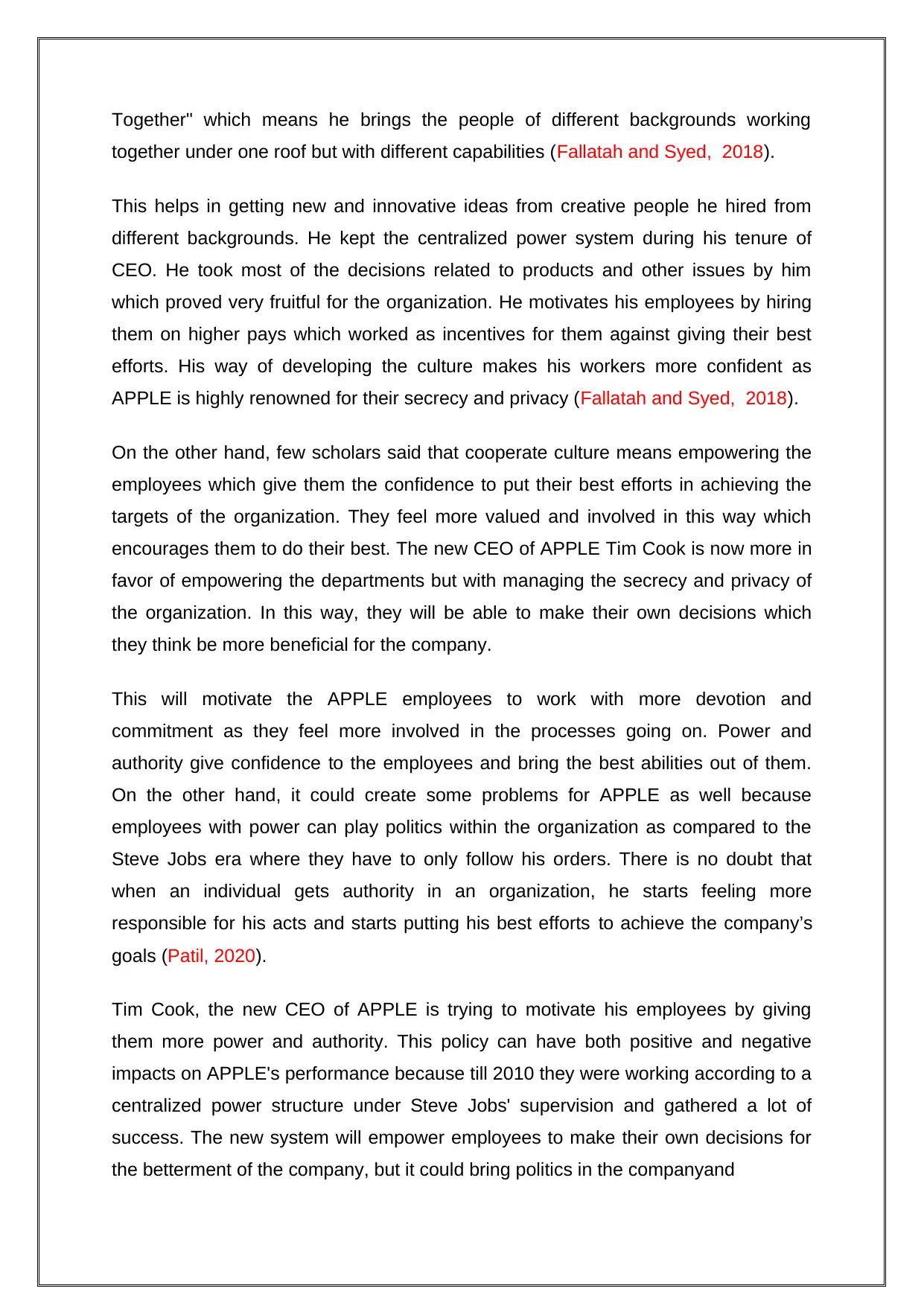
Together" which means he brings the people of different backgrounds working
together under one roof but with different capabilities (Fallatah and Syed, 2018).
This helps in getting new and innovative ideas from creative people he hired from
different backgrounds. He kept the centralized power system during his tenure of
CEO. He took most of the decisions related to products and other issues by him
which proved very fruitful for the organization. He motivates his employees by hiring
them on higher pays which worked as incentives for them against giving their best
efforts. His way of developing the culture makes his workers more confident as
APPLE is highly renowned for their secrecy and privacy (Fallatah and Syed, 2018).
On the other hand, few scholars said that cooperate culture means empowering the
employees which give them the confidence to put their best efforts in achieving the
targets of the organization. They feel more valued and involved in this way which
encourages them to do their best. The new CEO of APPLE Tim Cook is now more in
favor of empowering the departments but with managing the secrecy and privacy of
the organization. In this way, they will be able to make their own decisions which
they think be more beneficial for the company.
This will motivate the APPLE employees to work with more devotion and
commitment as they feel more involved in the processes going on. Power and
authority give confidence to the employees and bring the best abilities out of them.
On the other hand, it could create some problems for APPLE as well because
employees with power can play politics within the organization as compared to the
Steve Jobs era where they have to only follow his orders. There is no doubt that
when an individual gets authority in an organization, he starts feeling more
responsible for his acts and starts putting his best efforts to achieve the company’s
goals (Patil, 2020).
Tim Cook, the new CEO of APPLE is trying to motivate his employees by giving
them more power and authority. This policy can have both positive and negative
impacts on APPLE's performance because till 2010 they were working according to a
centralized power structure under Steve Jobs' supervision and gathered a lot of
success. The new system will empower employees to make their own decisions for
the betterment of the company, but it could bring politics in the companyand
together under one roof but with different capabilities (Fallatah and Syed, 2018).
This helps in getting new and innovative ideas from creative people he hired from
different backgrounds. He kept the centralized power system during his tenure of
CEO. He took most of the decisions related to products and other issues by him
which proved very fruitful for the organization. He motivates his employees by hiring
them on higher pays which worked as incentives for them against giving their best
efforts. His way of developing the culture makes his workers more confident as
APPLE is highly renowned for their secrecy and privacy (Fallatah and Syed, 2018).
On the other hand, few scholars said that cooperate culture means empowering the
employees which give them the confidence to put their best efforts in achieving the
targets of the organization. They feel more valued and involved in this way which
encourages them to do their best. The new CEO of APPLE Tim Cook is now more in
favor of empowering the departments but with managing the secrecy and privacy of
the organization. In this way, they will be able to make their own decisions which
they think be more beneficial for the company.
This will motivate the APPLE employees to work with more devotion and
commitment as they feel more involved in the processes going on. Power and
authority give confidence to the employees and bring the best abilities out of them.
On the other hand, it could create some problems for APPLE as well because
employees with power can play politics within the organization as compared to the
Steve Jobs era where they have to only follow his orders. There is no doubt that
when an individual gets authority in an organization, he starts feeling more
responsible for his acts and starts putting his best efforts to achieve the company’s
goals (Patil, 2020).
Tim Cook, the new CEO of APPLE is trying to motivate his employees by giving
them more power and authority. This policy can have both positive and negative
impacts on APPLE's performance because till 2010 they were working according to a
centralized power structure under Steve Jobs' supervision and gathered a lot of
success. The new system will empower employees to make their own decisions for
the betterment of the company, but it could bring politics in the companyand
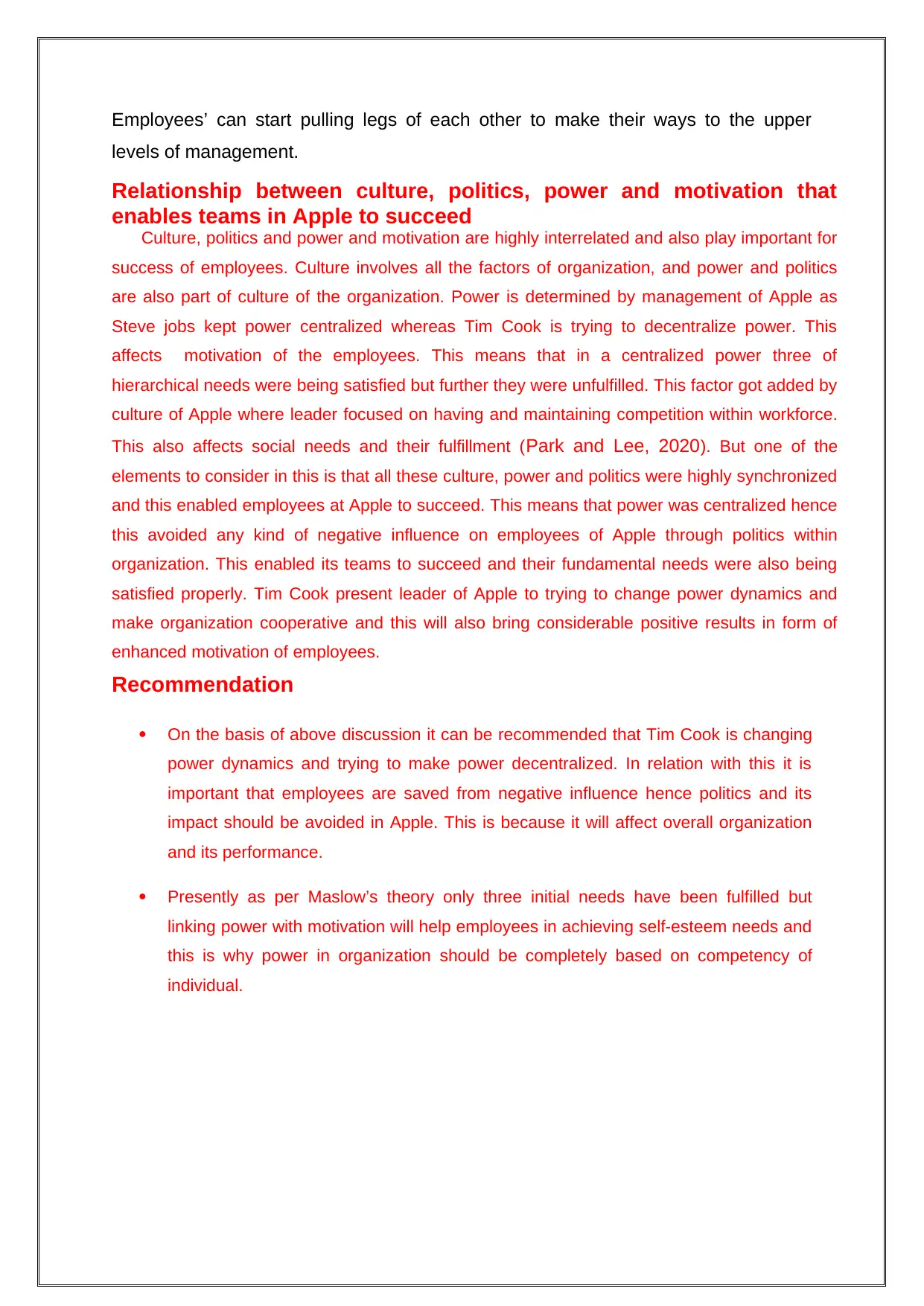
Employees’ can start pulling legs of each other to make their ways to the upper
levels of management.
Relationship between culture, politics, power and motivation that
enables teams in Apple to succeed
Culture, politics and power and motivation are highly interrelated and also play important for
success of employees. Culture involves all the factors of organization, and power and politics
are also part of culture of the organization. Power is determined by management of Apple as
Steve jobs kept power centralized whereas Tim Cook is trying to decentralize power. This
affects motivation of the employees. This means that in a centralized power three of
hierarchical needs were being satisfied but further they were unfulfilled. This factor got added by
culture of Apple where leader focused on having and maintaining competition within workforce.
This also affects social needs and their fulfillment (Park and Lee, 2020). But one of the
elements to consider in this is that all these culture, power and politics were highly synchronized
and this enabled employees at Apple to succeed. This means that power was centralized hence
this avoided any kind of negative influence on employees of Apple through politics within
organization. This enabled its teams to succeed and their fundamental needs were also being
satisfied properly. Tim Cook present leader of Apple to trying to change power dynamics and
make organization cooperative and this will also bring considerable positive results in form of
enhanced motivation of employees.
Recommendation
On the basis of above discussion it can be recommended that Tim Cook is changing
power dynamics and trying to make power decentralized. In relation with this it is
important that employees are saved from negative influence hence politics and its
impact should be avoided in Apple. This is because it will affect overall organization
and its performance.
Presently as per Maslow’s theory only three initial needs have been fulfilled but
linking power with motivation will help employees in achieving self-esteem needs and
this is why power in organization should be completely based on competency of
individual.
levels of management.
Relationship between culture, politics, power and motivation that
enables teams in Apple to succeed
Culture, politics and power and motivation are highly interrelated and also play important for
success of employees. Culture involves all the factors of organization, and power and politics
are also part of culture of the organization. Power is determined by management of Apple as
Steve jobs kept power centralized whereas Tim Cook is trying to decentralize power. This
affects motivation of the employees. This means that in a centralized power three of
hierarchical needs were being satisfied but further they were unfulfilled. This factor got added by
culture of Apple where leader focused on having and maintaining competition within workforce.
This also affects social needs and their fulfillment (Park and Lee, 2020). But one of the
elements to consider in this is that all these culture, power and politics were highly synchronized
and this enabled employees at Apple to succeed. This means that power was centralized hence
this avoided any kind of negative influence on employees of Apple through politics within
organization. This enabled its teams to succeed and their fundamental needs were also being
satisfied properly. Tim Cook present leader of Apple to trying to change power dynamics and
make organization cooperative and this will also bring considerable positive results in form of
enhanced motivation of employees.
Recommendation
On the basis of above discussion it can be recommended that Tim Cook is changing
power dynamics and trying to make power decentralized. In relation with this it is
important that employees are saved from negative influence hence politics and its
impact should be avoided in Apple. This is because it will affect overall organization
and its performance.
Presently as per Maslow’s theory only three initial needs have been fulfilled but
linking power with motivation will help employees in achieving self-esteem needs and
this is why power in organization should be completely based on competency of
individual.
⊘ This is a preview!⊘
Do you want full access?
Subscribe today to unlock all pages.

Trusted by 1+ million students worldwide
1 out of 23
Related Documents
Your All-in-One AI-Powered Toolkit for Academic Success.
+13062052269
info@desklib.com
Available 24*7 on WhatsApp / Email
![[object Object]](/_next/static/media/star-bottom.7253800d.svg)
Unlock your academic potential
Copyright © 2020–2026 A2Z Services. All Rights Reserved. Developed and managed by ZUCOL.




